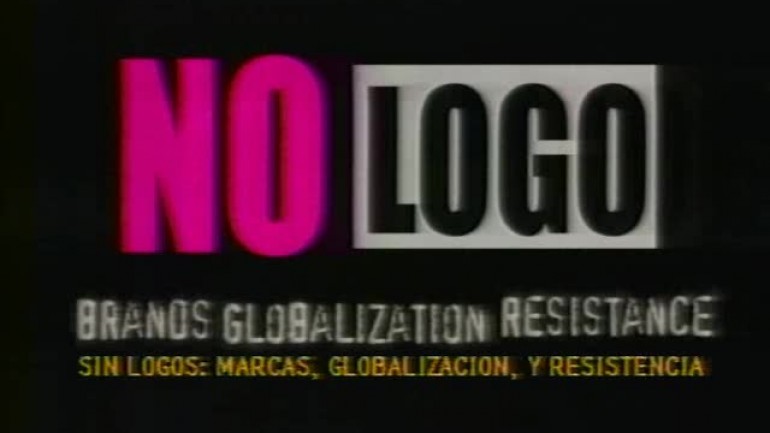In the age of the brand, logos are everywhere. But why do some of the world’s best-known brands find themselves on the wrong end of the spray paint can — the targets of anti-corporate campaigns by activists and protesters?
No Logo, based on the best-selling book by Canadian journalist and activist Naomi Klein, reveals the reasons behind the backlash against the increasing economic and cultural reach of multinational companies. Analyzing how brands like Nike,The Gap, and Tommy Hilfiger became revered symbols worldwide, Klein argues that globalization is a process whereby corporations discovered that profits lay not in making products (outsourced to low-wage workers in developing countries), but in creating branded identities people adopt in their lifestyles.
Using hundreds of media examples, No Logo shows how the commercial takeover of public space, destruction of consumer choice, and replacement of real jobs with temporary work – the dynamics of corporate globalization – impact everyone, everywhere. It also draws attention to the democratic resistance arising globally to challenge the hegemony of brands.





Naomi Klein definitely has an ability to identify problems with the market.
Unfortunately she has failed to derive the lesson of her own research.
It is the state which enables these corporations. Like too many others she can see the corruption, but she is mis-identifying the cause. In every example she gives, Klein identifies the role that states are playing in the corruption, but draws the conclusion that the corporations and their marketing are to blame.
Who is giving corporations incentives to exploit labor in other countries? The states are. Who is offering the enforcement, protecting the corporations from the formation of unions and protest? The states are. Who enforces the intellectual property right of the corporations? The states. Who is failing to prosecute the corporations when they commit crimes? The states. Who is selling off “the commons” and “privatizing” public resources? The states.
And corporations are, themselves, inventions of the state. They are not, in fact, private businesses, they are “publicly” traded.
This illustrates a chief mistake in klein’s understanding of the situation. She is criticizing the so called, “free market”, when in fact there is no such thing. Corporations don’t want “free markets” they don’t want to compete (as Klein points out, they want no choice, monopolies) and corporations don’t compete on a free market. They subsist, and have come to dominate the market, precisely because it is not free. They enjoy the benefits of protections offered by the state, to the wealthy, not due to any lack of ethics or morals, but simply as a matter of economics.
Which is THE chief problem with Klein’s philosophy, she does not understand that economics IS society, in the same way that ecology IS the eco-system.
Then of course there is her advocacy of Democracy, which I don’t think she fully understands. Democracy is a barbaric form of social order, institutional mob rule, which has failed to protect our human rights, and fails to provide the freedom to construct our own individual lives, based on our own individual values. Indeed how could Democracy protect individual freedom when it is predicated on the right of the majority to control the lives of individuals?
What we need, is simple, human, civility. And we will only have it, when we consciously choose to not coerce each-other.
We need Anarchism, voluntarism. A free society, and as a matter of course, a “free market”, where profit relates not to your ability to dominate society through a class system, but relies instead on the ability of the individual and collective to serve society.
You aproached the problem from another angle but the truth is that this is wrong, weed need to change this…anarchism? i don’t think so. To radical, society wont accept it. It has to be done gradually, and our way of thinking wont permit it. Our ability right now is to serve our own pockets.
Anarchy is not radical, it’s an idea of decentralized government. It’s become a dirty word over the past 90 years due to the western intervention. Just look at Spain in the early 30s or Central and Eastern Europe prior to WW I. Poland for example, had, what we now call Feudal Democracy, a king was actually elected by the voting nobles who held the power to “Liberum Veto” over the king’s decisions. While the peasants enjoyed feudal anarchy. The idea of anarchy dates back thousands of years, it’s not a new thing, neither it’s a failed system. The scary thing – the US in 33, when Hitler came to power in Germany and started his mistreatment of minorities and his building up of arms, looked at it and saw nothing wrong, but when they looked at Spain and the growing Anarchist movement, that’s where the saw threat, send their people and had the Spanish Anarchist movement killed off. Self-governance and decentralized gov’t are two very old ideas which worked for many thousands of years, but it’s an idea that’s hidden from the history chapters simply because it threatens the very fabric of control.